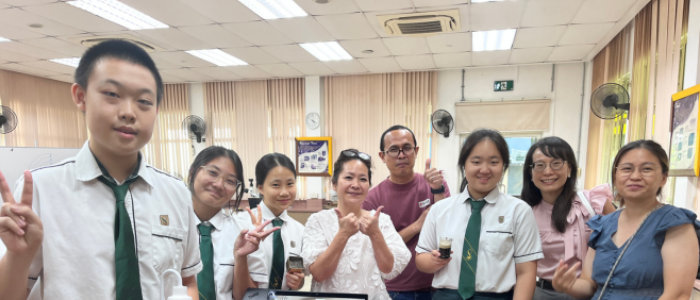The world we live in is changing rapidly. Technology is evolving at an unprecedented pace, with artificial intelligence (AI) reshaping industries, education, and daily life. This presents huge opportunities for the future of young people all over the world, but also brings complex challenges as they learn to navigate technology that seems to be reinventing itself daily. How can we prepare young minds for a future we can barely predict?
AI, in particular, has surged ahead, redefining possibilities faster than many imagined possible. In 2017, only 20% of organisations globally said they used AI in at least one area of their business. Just seven years later, this figure had soared to 78%. Excitement about AI has been growing among the public, too. Across the world, AI is widely seen as a force with the potential to positively impact education, healthcare, transportation, daily life and the economy.
Despite 80% of young people around the world interacting with AI multiple times a day, formal education into its responsible usage isn’t widespread, forcing many to rely on learning from friends, online platforms or their own experimentation. With 65% of young people globally lacking the digital skills needed for 90% of today’s jobs, there is a growing need to support skills development when it comes to AI and other new and emerging technologies. But the question remains: if technology is evolving at a pace which is impossible for formal education to keep up with, how can we support young people to navigate the digital world they will emerge into?
The answer lies in developing core lifelong skills which will support young people to interact with AI and other emerging technologies in a critical and responsible way.
Critical thinking
Perhaps the most essential skill to develop in young people in the age of AI is critical thinking. AI is prone to bias, baked into the coding or data training process, as well as ‘hallucinations’: incorrect or fabricated outputs. This problem is not likely to ease as the technology advances, either; in fact, research has shown that newer AI models are more likely to hallucinate than their predecessors. With young people all over the world turning to AI to find information, it is becoming all too easy for misinformation to spread unchecked. It is crucial that young people are supported to engage with AI outputs in a critical way, examining the reliability of sources and questioning the bias that might be shown rather than believing everything they read.
UNESCO lists critical thinking as the first key principle in its AI competency framework, which aims to develop a shared understanding of the core competencies that both students and teachers around the world need in order to fully utilise the potential of AI at the same time as mitigating its risks. It highlights the “necessity of exercising sufficient human control over AI” - encouraging young people to use AI as a tool, not a replacement for independent thought.
Communication
Employers around the world list communication skills as one of the largest skills gaps in the future workforce, with 81% of companies in the Asia Pacific region saying they struggle to find talent due to a lack of communication skills. According to LinkedIn Talent and Learning Solutions Senior Director ANZ, Adam Gregory, “communication is currently the most in-demand soft skill in Australia, as AI tools allow professionals to focus on uniquely human tasks such as communication, building relationships and collaborating with others.”
Communication skills are not only vital to stand out in a job market increasingly shaped by AI, but they are also vital when using AI itself. To be an effective tool, AI relies on the user’s ability to clearly communicate what they need it to do. Clear, well-defined prompts help to shape the AI’s response, and adding specificity regarding nuances such as target audience, tone and style can greatly improve the quality of the output.
Earlier this month, the ASEAN Foundation – supported by Google – launched AI Class ASEAN: an e-learning platform designed to teach young people in South Asia the skills they need to use AI “safely, inclusively and responsibly”. As part of this, there will be tools to help learners to articulate questions and prompts for AI, as well as communicate and collaborate across cultures.
Resilience
In an ever-changing world, young people are in desperate need of resilience. The world that they are entering is vastly different to that of even a decade ago, and the job market is shifting rapidly. In just 5 years’ time, an estimated 14% of jobs will be brand new, meaning that more than 1 in 10 young people are trying to prepare for a job that doesn’t currently exist. The rise of AI and other emerging technologies makes the future even more uncertain. It is vital that young people develop the resilience to deal with this uncertainty, and the adaptability to embrace change and continuous learning.
In Indonesia, the United Nations Development Programme (UNDP) and Microsoft piloted a programme aiming to support young people from “underserved, underrepresented, and digitally excluded communities” to develop AI fluency, as well as the skills they would need to “thrive in a rapidly evolving digital era”. This included a focus not only on digital skills, but on preparing for innovation and digital transformation by providing young people with the tools they need to continue learning throughout their lives.
Building these critical thinking, communication and resilience skills – among others – won't only help young people to navigate the ever-advancing technological world, it will ensure that they thrive as they enter the world of work and beyond, providing them with lifelong skills and allowing them to become confident, competent and resilient citizens.

